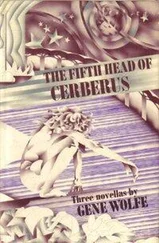Thecla must, I think, have been taken at least into the foothills of these heights, no doubt to escape the heat of some particularly torrid summer; for many of the scenes that rose in my mind (as it seemed, of their own accord) were noticeably childlike. I saw rock-loving plants whose virginal flowers I beheld with an immediacy of vision no adult achieves without kneeling; abysses that seemed not only frightening but shocking, as though their existence were an affront to the laws of nature; peaks so high they appeared to be literally without summit, as though the whole world had been falling forever from some unimaginable Heaven, which yet retained its hold on these mountains.
Eventually I reached Acies Castle, having walked almost the entire length of the city. I made my identity known to the postern guards there and was permitted to enter and climb to the top of the donjon, as I had once climbed our Matachin Tower before taking my leave of Master Palaemon.
When I had gone there to make my farewell to the only place I had known, I had stood at one of the loftiest points of the Citadel, which was itself poised atop one of the highest elevations in the whole area of Nessus. The city had been spread before me to the limits of vision, with Gyoll traced across it like the green slime of a slug across a map; even the Wall had been visible on the horizon at some points, and nowhere was I beneath the shadow of a summit much superior to my own.
Here the impression was far different. I bestrode the Acis, which leaped toward me down a succession of rocky steps each twice or three times the height of a tall tree. Beaten to a foaming whiteness that glittered in the sunlight, it disappeared beneath me and reappeared as a ribbon of silver racing through a city as neatly contained in its declivity as one of those toy villages in a box that I (but it was Thecla) recalled receiving on a birthday.
Yet I stood, as it were, at the bottom of a bowl. On every side the walls of stone ascended, so that to look at any one of them was to believe, for a moment at least, that gravity had been twisted until it stood at right angles to its proper self by some sorcerer’s multiplication with imaginary numbers, and the height I saw was properly the level surface of the world. For a watch or more, I think, I stared up at those walls, and traced the spidery lines of the waterfalls that dashed down them in thunder and clean romance to join the Acis, and watched the clouds trapped among them that seemed to press softly against their unyielding sides like sheep bewildered and dismayed among pens of stone.
Then I grew weary at last of the magnificence of the mountains and my mountain dreams — or rather, not weary, but dizzied by them until my head reeled with vertigo, and I seemed to see those merciless heights even when I closed my eyes, and felt that in my dreams, that night and for many nights, I would fall from their precipices, or cling with bloody fingers to their hopeless walls.
Then I turned in earnest to the city and reassured myself with the sight of the bartizan of the Vincula, a very modest little cube now, cemented to a cliff that was hardly more than a ripple among the incalculable waves of stone around it. I plotted the courses of the principal streets, seeking (as in a game, to sober myself from my long gazing on the mountains) to identify those I had walked in reaching the castle, and to observe from this new perspective the buildings and market squares I had seen on the way. By eye I looted the bazaars, finding that there were two, one on either side of the river; and I marked afresh the familiar landmarks I had learned to know from the embrasure of the Vincula — the harena, the pantheon, and the archon’s palace. Then, when everything I had seen from the ground had been confirmed from my new vantage point, and I felt I understood the spatial relationship of the place at which I stood to what I had known earlier of the plan of the city, I began to explore the lesser streets, peering along the twisted paths that climbed the upper cliffs and probing narrow alleys that often seemed no more than mere bands of darkness between buildings.
In seeking them out, my gaze came at last to the margins of the river again, and I began to study the landings there, and the storehouses, and even the pyramids of barrels and boxes and bales that waited there to be carried aboard some vessel. Now the water no longer foamed, save when it was obstructed by the piers. Its color was nearly indigo, and like the indigo shadows seen at evening on a snowy day, it seemed to slip silently along, sinuous and freezing; but the motion of the hurrying caiques and laden feluccas showed how much turbulence lay concealed beneath that smooth surface, for the larger craft swung their long bowspirits like fencers, and both yawed crabwise at times while their oars threshed the racing eddies.
When I had exhausted all that lay farther downstream, I leaned from the parapet to observe the closest reach of the river and a wharf that was no more than a hundred strides from the postern gate. Looking down at the stevedores there who toiled to unburden one of the narrow river boats, I saw near them, unmoving, a tiny figure with bright hair. At first I thought her a child because she seemed so small beside the burly, nearly naked laborers; but it was Dorcas, sitting at the very edge of the water with her face in her hands.
WHEN I REACHED Dorcas I could not make her speak. It was not simply that she was angry with me, although I thought so at the time. Silence had come upon her like a disease, not injuring her tongue and lips but disabling her will to use them and perhaps even her desire to, just as certain infections destroy our desire for pleasure and even our comprehension of joy in others. If I did not lift her face to mine, she would look at nothing, staring at the ground beneath her feet without, I think, seeing even that, or covering her face with her hands, as she had been covering it when I found her.
I wanted to talk to her, believing — then — that I could say something, though I was not certain what, that would restore her to herself. But I could not do so there on the wharf, with stevedores staring at us, and for a time I could find no place to which I could lead her. On a little street nearby that had begun to climb the slope east of the river, I saw the board of an inn. There were patrons eating in its narrow common room, but for a few aes I was able to rent a chamber on the floor above it, a place with no furniture but a bed and little space for any, with a ceiling so low that at one end I could not stand erect. The hostess thought we were renting her chamber for a tryst, naturally enough under the circumstances — but thought too, because of Dorcas’s despairing expression, that I had some hold on her or had bought her from a procurer, and so gave her a look of melting sympathy that I do not believe she noticed in the least, and me one of recrimination.
I shut and bolted the door and made Dorcas lie on the bed; then I sat beside her and tried to cajole her into conversation, asking her what was wrong, and what I might do to right whatever it was that troubled her, and so on. When I found that had no effect, I began to talk about myself, supposing that it was only her horror of the conditions in the Vincula that had moved her to sever herself from discourse with me.
“We are despised by everyone,” I said. “And so there is no reason why I should not be despised by you. The surprising thing is not that you should have come to hate me now, but that you could go this long before coming to feel as the rest do. But because I love you, I am going to try to state the case for our guild, and thus for myself, hoping that perhaps afterward you won’t feel so badly about having loved a torturer, even though you don’t love me any longer.
Читать дальше










